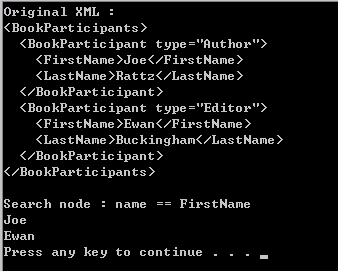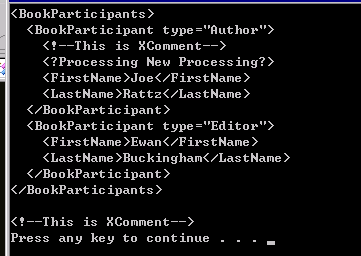XML을 얻는다면 일반적으로 XmlDocument를 선언하고, XmlDocument에서 지정된 Node의 선택과 node에 대한 Tree 구조로 탐색을 하게 된다. 그러나, LINQ를 사용하게 될 경우에는 이러한 Tree 구조 탐색에 별 의미가 없게 된다.


XElement에서 각 이름에 대한 검색 및 각 속성에 대한 검색을 모두 지원하고 있다. 다음 소스의 결과는 다음과 같다.
public void DoForAncestors()
{
XDocument xDocument = new XDocument(
new XElement("BookParticipants",
new XElement("BookParticipant",
new XAttribute("type", "Author"),
new XElement("FirstName", "Joe"),
new XElement("LastName", "Rattz")),
new XElement("BookParticipant",
new XAttribute("type", "Editor"),
new XElement("FirstName", "Ewan"),
new XElement("LastName", "Buckingham"))));
Console.WriteLine("Original XML : ");
Console.WriteLine(xDocument.ToString());
Console.WriteLine();
Console.WriteLine("Search node : name == FirstName");
var elements = xDocument.Element("BookParticipants").Descendants("FirstName");
foreach(var element in elements)
{
Console.WriteLine(element.Value);
}
}

기존의 경우에는 모든 node의 트리 구조를 알고 있어서 xpath를 이용해서 SelectSingleNode 또는 SelectNodeList를 이용해서 각 값을 구해주었지만, LINQ를 이용하면, node에 대한 이름만을 이용해서 얻는 것이 가능하다. 그리고 얻어진 node에서 각 Parent를 얻어내는 것도 가능하다.
여기에서 한가지 의문이 생기는 것이... 기존의 XmlDocument의 경우에는 거의 필요가 없는 class가 되어버리는 경향이 있는 것 같다. XmlDocument에서 이용하던 거의 모든 method들을 XDocument에서 제공하고 있으며, LINQ 및 보다더 선언적인 XML을 선언할 수 있는 것까지. 지금은 잘 모르겠지만.. 아무래도 XmlDocument를 앞으로는 사용할 일이 그다지 없지 않을까 라는 성급한 생각도 해보게 된다. (물론 .NET Framework 2.0에서의 경우는 또 다르다.;)
XML을 검색을 할때에 Element, Processing, Comment에 대한 검색을 하는 것 역시 LINQ에서 지원이 가능하다.
또한 선언적인 Type을 넣어줄 수 있기 때문에 코드의 가독성 역시 같이 높아진다.
public void SearchForType()
{
XDocument xDocument = new XDocument(
new XElement("BookParticipants",
new XElement("BookParticipant",
new XAttribute("type", "Author"),
new XComment("This is XComment"),
new XProcessingInstruction("Processing", "New Processing"),
new XElement("FirstName", "Joe"),
new XElement("LastName", "Rattz")),
new XElement("BookParticipant",
new XAttribute("type", "Editor"),
new XElement("FirstName", "Ewan"),
new XElement("LastName", "Buckingham"))));
Console.WriteLine(xDocument.ToString());
Console.WriteLine();
var elements = xDocument.Element("BookParticipants").
Elements("BookParticipant").Nodes().OfType<XComment>();
foreach(var element in elements)
{
Console.WriteLine(element);
}
}





